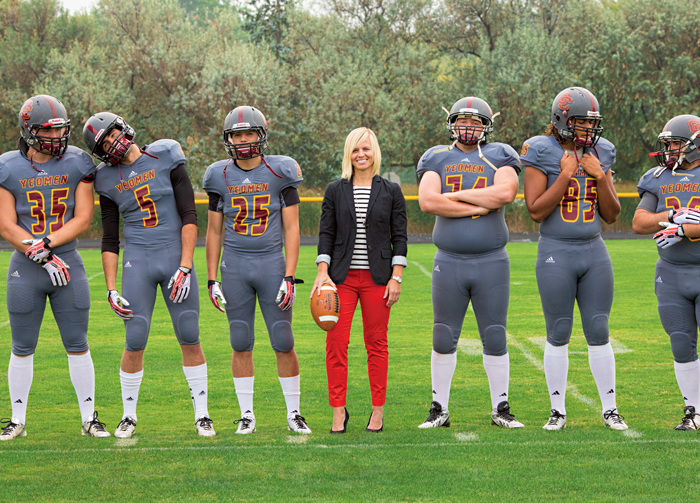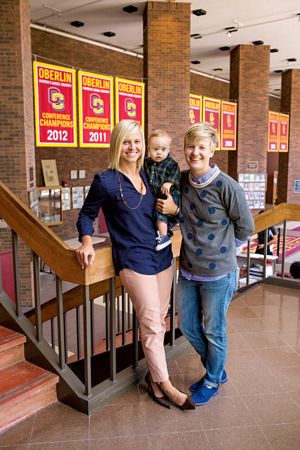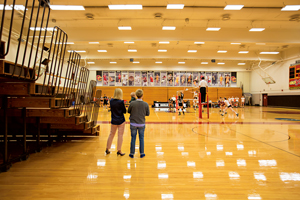Oberlin Alumni Magazine
Winter 2014 Vol. 109 No. 1

Coach Wink Hangs Tough
Athletics Director Natalie Winkelfoos had a game plan. And then it changed.
By Alicia Smith ‘10 Photographs by Tanya Rosen-Jones ‘97
It took only 20 minutes—half a regulation college basketball game.
With sportscenter playing in the background, Natalie Winkelfoos, Oberlin’s newest Delta Lodge Director of Athletics and Physical Education, channeled her inner coach as her partner Jennifer Reimer brought Griffin into the world like a champ.
“It was like coaching a game,” the 32-year-old recalls. “I was providing instruction and encouragement. I was excited. I was scared. I was sweating. The doctor and nurses were completely entertained by us.”
Griffin Robert Reimer-Winkelfoos came into the world on July 8, 2012, just like any other baby—crying, adorable, and unaware of why the world was suddenly so bright. Reimer and Winkelfoos introduced themselves to their little bundle of joy, smothering him with hugs and kisses. Then, the unofficial baby examination began: 10 fingers, 10 toes—all digits were intact. But for Winkelfoos, there was an unspoken knowingness that something was different. She noticed atypically small ears—traits not shared by Reimer or the couple’s sperm donor—a tall, Caucasian man with wavy hair. The donor was college-educated, artistic, athletic, and most importantly, had a clean bill of health. They knew everything about Mr. Sperm Donor except his real name.

Griffin Reimer-Winkelfoos.Photograph by Tanya Rosen-Jones.
The newborn’s life was planned for him before he even took his first breath. They expected that one day he would attend Stanford University and dominate on the varsity golf team. It was a plan his mothers were certain would lead to his career as a professional golfer and a “life of leisure on the links” for his parents.
Winkelfoos and Reimer met in 2006. Allegheny College’s men’s and women’s basketball teams were playing a double-header at Oberlin. Winkelfoos, or “Coach Wink” as her players called her at the time, was the assistant women’s basketball coach for Oberlin. Reimer was the head coach for the women’s basketball team at Allegheny. As the men’s game tipped off, the two started chatting when one of Allegheny’s women’s players approached them.
“Do you guys know each other?” she asked.
“No, not really,” Winkelfoos responded.
But to Winkelfoos, it felt like they did. She and Reimer hit it off and kept in touch throughout the season. Later, they ran into each other at a high school tournament in Columbus where college coaches seek to recruit future players. It was St. Patrick’s Day, and Winkelfoos was the only one not wearing green (“I didn’t want to look like everyone else!” she says). Her distinction paid off, and Reimer spotted her from across the room.
After dating long distance for a year, Reimer relocated to the Cleveland area when the head women’s basketball coaching job at Case Western Reserve University became available. Winkelfoos makes a point of being open about her relationship with Reimer. One of her goals as the director of athletics is to combat stereotypes of lesbians, particularly those in athletics. She identifies as gay, but her sexual orientation and appearance don’t define her. More importantly, she wants to love who she loves without being categorized.
“It’s important to me that our student-athletes can see the personal side of me. I’m not just the athletics director—they will see my partner and my son standing on the sidelines with me,” she says. “I hope to empower people to embrace their true selves by just being open and honest about who I am. If there are students or colleagues who think that they can’t have a ‘typical life’ with children and a good job because they are gay, then I want them to be able to look at my family and say, ‘They have it. You know—I can have that too!’ It’s healthy to see healthy relationships whether they are same-sex or not.”
Both Winkelfoos and Reimer knew that one day they wanted to expand their family, and Griffin was just what they had dreamed of. Winkelfoos imagined parenting would be straightforward. Every day they would feed him, clean him, clothe him, and put him to sleep. She assumed her work ethic would help her excel as a mother just as she had as a basketball player: her career at Ohio’s Bucyrus High School ended with more than 1,000 points scored, and she still holds the scoring record for both boys and girls. In college, she set a school record at Baldwin-Wallace University for three-point shooting percentage.
They’d teach Griffin to love basketball too. On game days they’d take him to Cleveland to watch Reimer coach at Case Western. On other days, he’d yell “Go Yeo!” from the bleachers of Philips Gym.
Their first night together in the hospital with their newborn was long awaited. They were finally a family of three.
The next morning, they received unexpected news.
Winkelfoos’ life over the past several years has been full of unanticipated turns—particularly her meteoric rise through the ranks of Oberlin’s athletics administration.
“Some people think winning comes at a cost that is negative, but I’m not a believer in that.”
Fresh out of Kent State University’s graduate program in higher education administration and student personnel in 2005, Winkelfoos was ready to start on her journey to one day becoming a college athletics director. Her coach at Baldwin-Wallace advised her that a coaching stint would help her achieve her goal, and Oberlin had an opening for assistant women’s basketball coach.
“Coaching at Oberlin really opened my eyes to the mental aspect of the game. The student-athletes are wildly intelligent. My mindset [as a player] was just to go out and play. If my coach told me I needed to run through a brick wall, I may have done it,” Winkelfoos says. “But an Oberlin student asks why. ‘Because I said so’ does not work with Oberlin student-athletes.”
Over the next few years, she took advantage of open opportunities in Oberlin’s athletics administration, touching nearly every rung of the leadership ladder. From her coaching debut in 2005 until she took over as the director of athletics in December 2012, she went from wearing a whistle to organizing promotional campaigns to orchestrating meetings with some of the college’s most-respected alumni. Never taking herself too seriously, she even wore a giant hot dog costume at a Yeowomen soccer game as part of the “Franks for Coming” campaign to draw in more student fans via free hot dogs.
Former Oberlin College Director of Athletics Joe Karlgaard, who has been a mentor to Winkelfoos, has nothing but positive things to say about her. “She has a way about her. She’s a very charismatic person,” says Karlgaard, who was recently named director of athletics, recreation and lifetime fitness at Rice University. “You instantly like her, and she instantly likes you.”
It’s a trait she had long before coming to Oberlin. Cheri Harrer, her coach at Baldwin-Wallace, says Winkelfoos was always a “fan favorite” for her infectious spirit on the hardwood. “If you were to ask anyone at that time who their favorite player was, they would’ve said Natalie,” she says.
Once, after making a layup during a game, she high-fived everyone on the Baldwin-Wallace bench on her way back to play defense. Another time, she took a defensive charge and did a somersault to return to her feet. “You could tell even then that she had this type of personality that allowed her to connect with people in a caring way and also have fun. She’s just a people person,” Harrer says.
Most people have no idea what is going on inside her head given her perky, confident, smiling exterior. This was especially true after Winkelfoos returned to work shortly after Griffin was born.
The morning after his birth, Winkelfoos had just gotten out of the shower of their hospital suite. Her wet hair was wrapped in a towel and she’d just put on a Stanford t-shirt when the family’s pediatrician walked into the room.
The doctor came in and congratulated them on their new addition. Her next remark hit them like a ton of bricks: “I believe Griffin has Down syndrome.”
It’s a moment Winkelfoos will never forget. “I wanted to run away, but I couldn’t move,” she says. “I had a lot of conflicting feelings in that moment. I was ecstatic we had our son but frightened of our new reality.”
Fleeting thoughts from the day before re-emerged. The possibility crossed her mind after Griffin’s birth when some of his features resembled those associated with Down syndrome. But no, she thought, it couldn’t be true.
“Are you sure?” Reimer asked the doctor.
“Yes. We will run tests to be certain,” she replied.
Sure enough, tests revealed that he had 47 chromosomes instead of the usual 46. One extra chromosome could have big implications for Griffin—decreased muscle tone, smaller nasal passages, hearing troubles, and delays in speech. But in the immediate future, Griffin would have to call the Cleveland Clinic his home. He slept a lot. His moms cried tears of joy and fear.
“Why couldn’t an extra chromosome give him superpowers? How crazy would that be? ‘Yep. That’s my son…he can fly. No big deal. Carry on.’” Winkelfoos jokes. “My dreams of Stanford for him had to change. The plans I made for him had to be adjusted.”

Natalie Winkelfoos and partner Jennifer Reimer with their son, Griffin Reimer-Winkelfoos.Photograph by Tanya Rosen-Jones.
For the next 42 days, the mothers split their time between their Lakewood home and the Cleveland Clinic’s neonatal intensive care unit, where their son spent the first month and a half of his life. Going back and forth between home No. 1, home No. 2, and work, watching their boy work to get better, they felt like they were living the same day over and over again. As Winkelfoos describes it, “it was Groundhog Day.” But Griffin kept them going.
More issues began to pile up. It was hard for him to breathe. His weakened heart made breastfeeding too taxing on his body, so he needed a feeding tube to eat. When he was six months old, he had open-heart surgery to mend the holes in his heart. Parenting in itself is hard—especially for new parents—but the unexpected challenges made life with Griffin particularly complex. Winkelfoos and Reimer started seeing a counselor.
“I was never one of those people that was like, ‘Yay! Counseling!’ But it was the best thing we’ve ever done for us and for Griffin,” Winkelfoos says. “The majority of our time spent with her [the counselor] was us [Winkelfoos and Reimer] crying, being angry, and being confused. But we were still so happy we had Griffin. It was a rollercoaster ride.”
Putting on a happy face at work became an additional challenge. Consistently being a rock of positivity as the interim director of athletics sometimes took its toll.
“Many days I’d show up but not be 100 percent present. My head was spinning and my heart was reeling. I had to lean on my staff and colleagues to keep our department moving forward and to keep me going,” she confesses.
Despite the difficult times, Winkelfoos has already made her mark on Oberlin sports history. She is the first female director of athletics to oversee both men’s and women’s varsity sports and has secured the largest donation ever made to the athletics department ($8 million—see page 6). Recently, Winkelfoos served on the North Coast Athletic Conference Diversity Committee to help create a program to mentor women and minority students. She also assisted in establishing Oberlin’s first-ever varsity student-athlete transgender inclusion policy.
A fierce competitor, Winkelfoos is determined to increase the number of wins for every team and helping her staff recruit high-quality, committed student-athletes. Mostly, though, she wants to see student-athletes have an experience that will translate into a successful and fulfilling life after Oberlin.
“Every day I go to work with the goal of leaving the office feeling like I did something to make Oberlin athletics stronger. Most don’t think ‘powerhouse’ when they think of Oberlin athletics, but why not? Some people think winning comes at a cost that is negative, but I’m not a believer in that,” Winkelfoos says. “Like professors and deans, our coaches and administrators want to help students reach their full potential.”
It’s a mindset that has been noted by others and is already paying off.
“A lot of the teams have taken real turns, and they’re becoming a lot more competitive. I think that’s what she’s really bringing,” says Sean Gavin ’98, president of the Heisman Club, an alumni group that provides support for Oberlin athletes. “She’s making Oberlin believe it can be competitive in all sports. That’s something Oberlin has struggled with from time to time.”
Part of Winkelfoos’ vision for the future of the Oberlin athletics department lies in the physical spaces where competition and fitness take place. The athletics department is in the middle of a capital campaign with the goal of raising approximately $15 million to fund several construction projects, including revitalizing the Philips Physical Education Center and Robert Carr Pool, building a new health and wellness center, and converting the Savage Football Stadium to a multi-use athletics complex.
“With aged facilities we are not meeting the demands of the campus. Our community deserves better,” Winkelfoos says. Winkelfoos is confident these changes will encourage the adoption of lifelong healthy behaviors and foster greater interaction throughout the campus community.
“It’s not just about varsity athletics. It’s about providing an opportunity for the entire campus to be well,” Winkelfoos says. “We are an incredibly smart collection of people. Imagine how much more innovative we could be if we took better care of ourselves physically and mentally. After all, a healthy body nourishes a healthy mind.”
Winkelfoos’ to-do lists are long and detailed. But recently, she has embraced the times when to-do lists go awry.
She never planned to still be in Oberlin, in a lifelong relationship with a woman, and a mommy to a child with Down syndrome. Parenthood has given her a greater appreciation for each day’s unexpected little victories: seeing two coaches working together; hearing Oberlin alumni gush about their time on campus; writing a clever email; or watching a former player thrive in life after Oberlin.
“I love a good plan, but I have learned that it’s in the moments when a plan takes a different route that you learn how good of a leader you actually are,” she says. “You expect one thing and get another, but what you can still get is truly amazing.”
Griffin is the embodiment of that. His life had a blueprint before he even took his first breath, but the outline of his life is being rewritten every day. Now a thriving 1-year-old, Griffin brings new challenges, and more importantly, new sources of joy and inspiration to Winkelfoos and Reimer than they ever could have imagined. Each week, Griffin goes to occupational therapy, speech therapy, and physical therapy. He goes to daycare and plays with other kids. He laughs a lot, especially when mommy Winkelfoos plays the 1…2…3…throw-Griffin-into-the-air game. He eats baby food, waves to strangers, and takes naps. Many people think he’s always happy, but his moms know he’s far from that when he doesn’t get his way. He’s a typical child with some atypical extra-chromosomal challenges.

Doctors can’t be sure of the number of mountains Griffin will have to climb, but his muscle strength and progress throughout therapies are good indications of what’s to come. Griffin may not play in the Professional Golf Association as once planned, but his moms have no doubt that he will exceed whatever expectations the world puts on him. They love him more than they ever could have imagined.
“Our life isn’t so different from any other family’s, we just have more doctors appointments,” says Winkelfoos. “He’s a little Yeoman. He defines giving a Yeoman’s effort.”
Alicia Smith ‘10, a writer living in Cleveland, is pursuing a PhD in sociology at Case Western Reserve University.

Want to Respond?
Send us a letter-to-the-editor or leave a comment below. The comments section is to encourage lively discourse. Feel free to be spirited, but don't be abusive. The Oberlin Alumni Magazine reserves the right to delete posts it deems inappropriate.